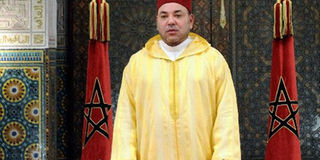Morocco now asks to rejoin the African Union

King Mohammed VI of Morocco delivering a speech on July 30, 2013 in Casablanca marking his 14 year anniversary on the throne, in Casablanca, Morocco. Morocco has formally announced its wish to rejoin the African Union, 32 years after leaving the organisation. PHTOTO | AFP
What you need to know:
- Moroccan King Mohammed VI said the time had come for his country to retake its place within its institutional family.
- Morocco left the AU in 1984, after the organisation recognised the independence of Western Sahara.
- Morocco is the only African country that is not an AU member.
Morocco has formally announced its wish to rejoin the African Union, 32 years after leaving the organisation.
In a message to the AU summit in Rwanda, the Moroccan King Mohammed VI said the time had come for his country to retake its place within its institutional family.
Morocco left the AU in 1984, after the organisation recognised the independence of Western Sahara.
Moroccans describe Western Sahara as their country’s “southern province”. For more than three decades, Morocco has refused to be part of the organisation.
In March, it threatened to pull its soldiers out of UN global peacekeeping missions because of the dispute.
Now, the Moroccan authorities seem to have concluded their absence has not helped them diplomatically over Western Sahara and many other issues, says the BBC’s Africa Reporter James Copnall.
They sent a special envoy to lobby African leaders at their summit in the Rwandan capital Kigali this weekend.
The AU has said that it will continue pushing for the rights of the people of Western Sahara to hold a self-determination referendum.
Morocco is the only African country that is not an AU member.
The Kingdom of Morocco is the most westerly of the North African countries known as the Maghreb - the “Arab West”. It has Atlantic and Mediterranean coastlines, a rugged mountain interior and a history of independence not shared by its neighbours.
Morocco was a French protectorate from 1912 to 1956, when Sultan Mohammed became king.
TERRITORIAL DISPUTE
He was succeeded in 1961 by his son, Hassan II, who ruled for 38 years and played a prominent role in the search for peace in the Middle East.
Western Sahara is a sparsely populated area of mostly desert situated on the northwest coast of Africa.
A former Spanish colony, it was annexed by Morocco in 1975. Since then, it has been the subject of a long-running territorial dispute between Morocco and its indigenous Saharawi people, led by the Polisario Front.
A 16-year-long insurgency ended with a UN-brokered truce in 1991 and the promise of a referendum on independence, which is yet to take place.
Although under the de facto administrative control of Morocco, the status and sovereignty of Western Sahara remain unresolved and numerous direct talks have failed to break the political deadlock.
The Polisario Front proclaimed the Saharan Arab Democratic Republic (SADR) in 1976, with a government in exile in Algeria. The SADR is now recognised by many governments and is a full member of the AU.
Home to phosphate reserves and rich fishing grounds off its coast, Western Sahara is also believed to have as yet untapped offshore oil deposits.
Mohamed Abdelaziz Ezzedine, who had been president of the SADR since 1980, died in 2016 after a long illness.
He was one of the founding members of the Polisario Front and had served as its secretary-general since 1976.
Khatri Addouh became acting SADR president and secretary-general of the Polisario Front on the death of Mr Abdelaziz, pending elections for a new president.





